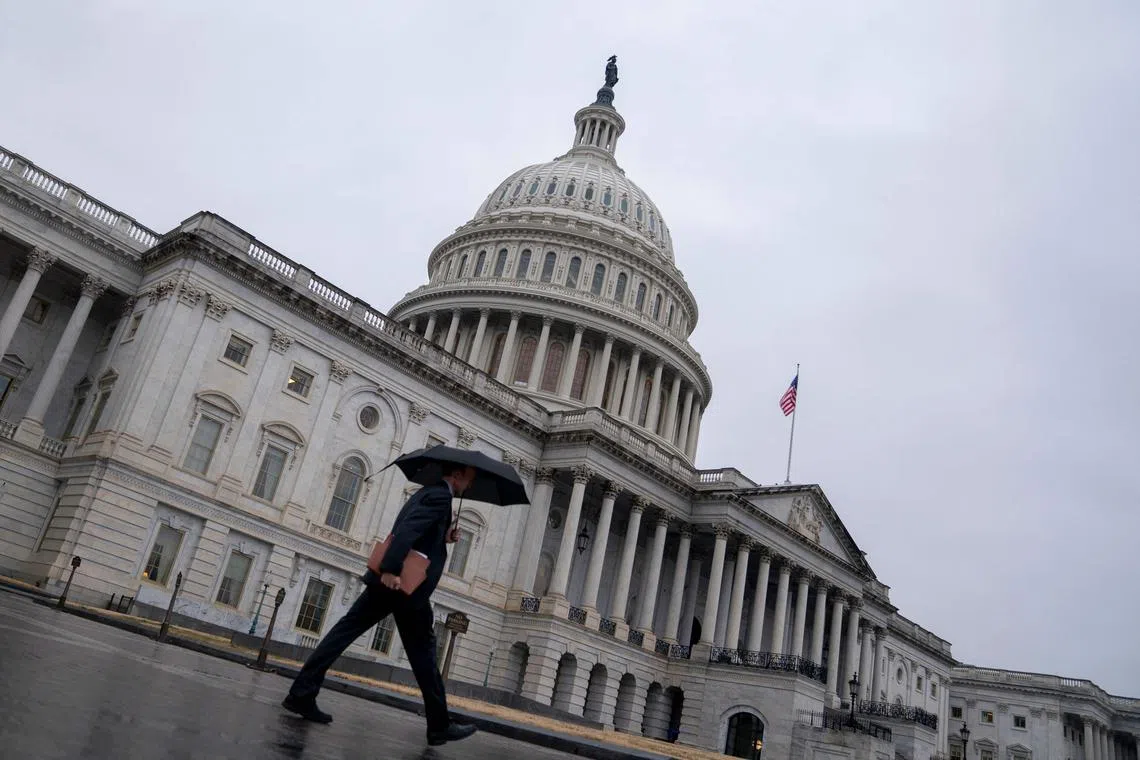Analysts expect last-minute US debt limit deal amid political brinkmanship
Sign up now: Get ST's newsletters delivered to your inbox

Should the political stand-off not be resolved in time, it risks a fiscal crisis that could send the US into a recession.
PHOTO: AFP
Follow topic:
WASHINGTON – Democrats and Republicans have dug further into their opposing positions on the debt limit, as the United States Treasury began special measures
Analysts, however, remain somewhat optimistic that an agreement to raise the debt ceiling will be reached before the government defaults in June, albeit most likely at the eleventh hour.
Republican hardliners want significant spending cuts before they agree to raise the debt limit, but Democrats want the ceiling raised in a “clean” hike without conditions.
While raising the debt ceiling is regularly done on a bipartisan basis, Republicans have made it a priority in 2023 to use it as leverage to get federal spending slashed.
Should the political stand-off not be resolved in time, it risks a fiscal crisis that could send the US into a recession.
Eurasia Group US managing director Jon Lieber told The Straits Times: “The odds of a deal before June are low, but the good news is that this is only the beginning of the period where the US could default, and based on economic conditions, Congress could still have several more months before it must act.”
“A deal is likely to come but only at the last minute and only once an external market reaction forces Congress to appreciate the severity of not acting,” he added.
Rating agency Moody’s Investors Service also expects the Congress to reach an agreement in time, although it warns of protracted negotiations. “Given an extremely fractious political environment, we anticipate an agreement will likely be reached only very late or in an incremental fashion, potentially contributing to flare-ups in financial market volatility,” it said in a note on Thursday.
Moody’s added that if Congress failed to reach a deal on the debt limit, the US government was still expected to meet its debt service obligations on time and in full, putting them ahead of other payments.
Fitch Ratings senior director Richard Francis told Reuters that he also expected a debt limit agreement would be reached.
“We do recognise obviously that there is a tail risk that they won’t be able, for whatever reason, to come to some kind of agreement by the X date... and it’s not clear to us... if the government has the ability or the willingness to prioritise payments,” he added.
The Biden administration has said it is not open to negotiations, and Senate Democrats reiterated the position on Thursday.
“Political brinkmanship with the debt limit would be a massive hit to local economies, American families and would be nothing less than an economic crisis at the hands of the Republicans,” said Senate majority leader Chuck Schumer in a Thursday statement.
While similar political crises were resolved in the past, there is concern among some analysts that this time might be different.
“There is a higher-than-usual risk this year that the US slips past the so-called X date and must miss payments to vendors and prioritise payments to bond holders for the first time ever,” said Eurasia Group’s Mr Lieber, referring to the point at which the US exhausts its cash and borrowing ability.
“It is unclear if this would be treated as a default though it could trigger a downgrade by the credit rating agencies,” he added.
Senate minority leader Mitch McConnell told reporters on Thursday that he was not concerned about a financial crisis, as he was confident that Republicans would “end up in some kind of negotiation with the administration” over the conditions under which the debt limit could be raised.
“In the end, I think the important thing to remember is that America must never default on its debt. It never has, and it never will,” he said.

